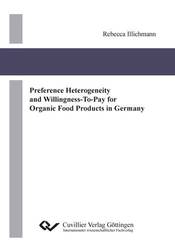| Fachbereiche | |
|---|---|
| Buchreihen (97) |
1384
|
| Nachhaltigkeit |
3
|
| Gesundheitswesen |
1
|
| Geisteswissenschaften |
2379
|
| Medienwissenschaften | 16 |
| Theologie | 57 |
| Philosophie | 102 |
| Rechtswissenschaft | 424 |
| Wirtschaftswissenschaften | 856 |
| Sozialwissenschaften | 418 |
| Sportwissenschaften | 48 |
| Psychologie | 233 |
| Pädagogik | 190 |
| Geschichtswissenschaften | 183 |
| Kunstwissenschaften | 111 |
| Kulturwissenschaften | 167 |
| Literaturwissenschaften | 117 |
| Sprachwissenschaften | 89 |
| Naturwissenschaften |
5410
|
| Ingenieurwissenschaften |
1800
|
| Allgemein |
98
|
|
Leitlinien Unfallchirurgie
5. Auflage bestellen |
|
Erweiterte Suche
Preference Heterogeneity and Willingness-To-Pay for Organic Food Products in Germany
Rebecca Illichmann (Autor)Vorschau
Leseprobe, PDF (130 KB)
Inhaltsverzeichnis, PDF (42 KB)
Over the last decade, the market for organic food products in Germany has grown steadily, as consumers become increasingly aware of credence characteristics of food products. The primary goal of this study is to integrate psychometric data into a choice experiment to examine preference heterogeneity among consumers and their willingness-to-pay for organic products. In particular, the role of trust and gender are considered in analysing both preferences and willingness-to-pay for organic products. The results of the mixed logit models reveal significant heterogeneity in preferences among consumers for the products examined. The second focus of this study is the effect of starting point bias on the willingness-to-pay estimates obtained. The use of different prices in the first choice set results in different distributions of choices and significantly different preferences and willingness-to-pay estimates in two otherwise identical choice set designs. The results of the latent class models indicate that consumers’ trust perceptions tend to significantly influence their preferences for organic food products. The findings of this study indicate that some consumer groups are willing to pay high price premiums for specific organic food products and, to some extent, for locally produced food. As there is consumer segmentation based on varying levels of trust and due to the heterogeneous preferences of the consumers, organic food marketing should increase its use of suitable communication strategies concerning quality attributes.
| ISBN-13 (Printausgabe) | 9783954046454 |
| ISBN-13 (E-Book) | 9783736946453 |
| Buchendformat | A5 |
| Sprache | Englisch |
| Seitenanzahl | 278 |
| Auflage | 1. Aufl. |
| Erscheinungsort | Göttingen |
| Promotionsort | Kiel |
| Erscheinungsdatum | 07.03.2014 |
| Allgemeine Einordnung | Dissertation |
| Fachbereiche |
Wirtschaftswissenschaften
|
| Schlagwörter | Organic food, choice experiment, preference heterogeneity, willingness-to-pay |








